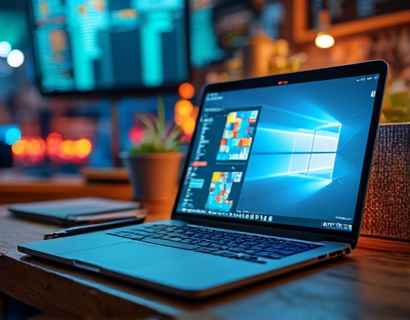Decentralized File Management: Elevate Business Collaboration with a Secure and User-Friendly Online Platform
In the rapidly evolving landscape of business collaboration, the need for efficient, secure, and user-friendly file management solutions has never been more critical. Traditional centralized file management systems often fall short in meeting the demands of modern teams, leading to bottlenecks, security risks, and decreased productivity. This article explores the transformative power of decentralized file management, highlighting how a cutting-edge online platform can redefine how businesses and teams handle file sharing and organization.
Understanding Decentralized File Management
Decentralized file management represents a paradigm shift from the conventional centralized model. In a decentralized system, data is not stored in a single location but is distributed across a network of nodes. This approach offers several advantages, including enhanced security, improved reliability, and greater control for users. Unlike centralized systems where a single point of failure can compromise the entire network, decentralized systems are more resilient to attacks and data loss.
Key Benefits of Decentralized File Management
- Enhanced Security: Decentralized systems reduce the risk of data breaches by eliminating a single point of attack. Data is encrypted and spread across multiple nodes, making it extremely difficult for unauthorized users to access sensitive information.
- Improved Reliability: With data distributed across various nodes, the likelihood of complete data loss is significantly reduced. Even if one node fails, the data remains accessible through other nodes, ensuring continuous access and minimal downtime.
- Increased Efficiency: Decentralized file management streamlines workflows by allowing real-time collaboration and instant access to files from anywhere in the world. This eliminates the need for cumbersome file transfers and version control issues, boosting overall productivity.
- User Control: Users have greater control over their data, determining who can access it and under what conditions. This level of granularity in access control enhances privacy and compliance with data protection regulations.
User-Friendly Interface for Seamless Collaboration
A key feature of the decentralized file management platform is its intuitive and user-friendly interface. Designed with the end-user in mind, the platform simplifies complex file management tasks, making it accessible to users of all technical backgrounds. The interface is clean, intuitive, and easy to navigate, ensuring that team members can focus on their work rather than struggling with cumbersome tools.
The platform supports seamless file sharing and organization, allowing teams to create, upload, and manage files with ease. Advanced search functionalities and smart tagging systems help users quickly locate specific files, reducing time spent on searching and increasing productivity. Additionally, the platform supports version control, ensuring that all team members are working with the most up-to-date files and reducing the risk of conflicts.
Decentralization and Data Privacy
Data privacy is a paramount concern for businesses and teams handling sensitive information. Decentralized file management addresses this concern by distributing data across a secure network, minimizing the risk of unauthorized access. Each file is encrypted both in transit and at rest, ensuring that even if data is intercepted, it remains unreadable without the proper decryption keys.
Users have full control over their data, including the ability to set permissions and revoke access as needed. This level of control is crucial for maintaining compliance with regulations such as GDPR and HIPAA, which mandate strict data protection measures. The decentralized approach ensures that data remains within the organization's control, reducing the risk of external breaches and data leaks.
Scalability and Flexibility
One of the most significant advantages of decentralized file management is its scalability. As businesses grow and evolve, their file management needs change. A decentralized platform can easily scale to accommodate increasing data volumes and user counts without compromising performance. This flexibility makes it an ideal solution for businesses of all sizes, from startups to large enterprises.
Moreover, the platform is designed to integrate seamlessly with existing workflows and tools, ensuring a smooth transition from traditional file management systems. APIs and plugins are available to facilitate integration with popular productivity tools, further enhancing the platform's versatility and utility.
Real-World Applications and Use Cases
The benefits of decentralized file management extend across various industries and use cases. In the healthcare sector, for instance, patient records can be securely shared among multiple providers, ensuring that everyone has access to the most current information while maintaining patient privacy. In the legal industry, decentralized storage can secure sensitive documents and facilitate collaboration among legal teams across different locations.
For remote teams and distributed organizations, the platform enables seamless collaboration without the need for physical presence. Files can be accessed and edited in real-time, fostering a collaborative environment that mirrors in-office workflows. This is particularly valuable for global teams spanning multiple time zones, as it ensures that all team members are on the same page, regardless of their location.
Challenges and Considerations
While the benefits of decentralized file management are clear, there are several considerations to keep in mind when adopting such a system. One potential challenge is the initial setup and migration of existing data to a decentralized platform. This process requires careful planning and execution to ensure data integrity and security during the transition.
Another consideration is the need for user education and training. Since the platform operates differently from traditional centralized systems, users must be familiar with the new workflows and features. Providing comprehensive training and support can help overcome this hurdle and ensure a smooth adoption process.
It's also important to evaluate the technical infrastructure required to support a decentralized platform. While the platform itself is designed to be scalable, organizations must ensure that their network and hardware can handle the increased load, especially during peak usage periods.
Future Trends in Decentralized File Management
The future of decentralized file management is promising, with several emerging trends set to enhance its capabilities and adoption. One such trend is the integration of blockchain technology, which can further secure data transactions and enhance transparency. Blockchain can provide an immutable record of file access and modifications, adding an extra layer of security and accountability.
Another trend is the incorporation of artificial intelligence and machine learning to optimize file management processes. AI can help automate routine tasks, such as file categorization and backup, freeing up users to focus on more strategic activities. Additionally, AI-driven analytics can provide insights into usage patterns and help organizations optimize their file management strategies.
Interoperability is also a key area of development, with efforts to create standards that allow different decentralized platforms to communicate and share data seamlessly. This will facilitate a more connected ecosystem, enabling businesses to choose the best tools for their specific needs without being locked into a single platform.
Conclusion
Decentralized file management represents a significant advancement in how businesses and teams handle file sharing and organization. By leveraging the power of decentralization, security, and user-friendly interfaces, these platforms offer a robust solution to the challenges faced by traditional centralized systems. As organizations continue to prioritize efficiency, security, and collaboration, adopting a decentralized file management approach will be crucial for staying competitive and agile in today's fast-paced business environment.











































